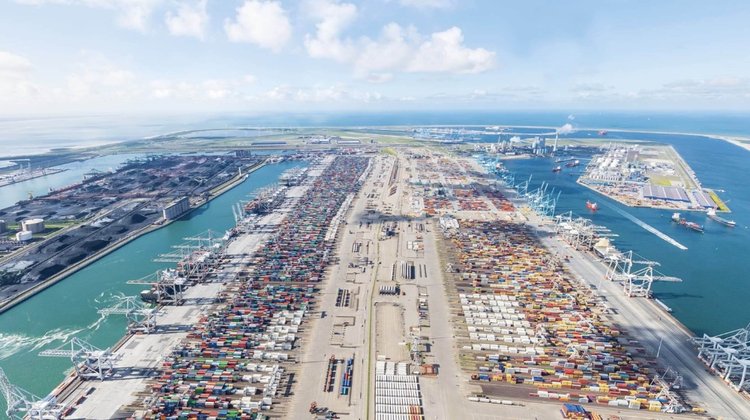Rotterdam port to become an international hydrogen hub, how Cyprus can benefit
08:51 - 24 February 2025

The Port of Rotterdam, the largest in Europe, aims to become an international hub for the production, import, application and transport of hydrogen to other countries in northwestern Europe.
EU has set targets for the production of 20 million tons of hydrogen by 2030.
A group of Cypriot journalists recently visited the port on a trip organised by the Embassy of the Netherlands in Nicosia.
The journalists spoke with the coordinator of the hydrogen energy program at the port, as well as with the press representative and a representative of the energy transition program, who explained in detail how the port will become an importer of a large-scale hydrogen network throughout the port complex.
The hydrogen hub will enable Rotterdam to maintain its position as an important energy port for northwestern Europe in the future.
The role of hydrogen in Europe's energy needs is constantly increasing. In addition to replacing natural gas for heat generation in industry, hydrogen is becoming a building block in sustainable chemistry for the production of products.
Moreover, hydrogen is becoming an important energy carrier in aviation and shipping, for heavy road transport and for providing heat to households and greenhouses.
The Port of Rotterdam is currently exploring the possibilities of importing green hydrogen with more than 150 projects worldwide.
There are already agreements with 25 countries around the world, including Norway, Spain, Scotland, the United States, Canada, Brazil, Australia and Namibia.
As explained to Cypriot journalists, the bulk of the transportation costs are mainly related to making hydrogen suitable for transport. It is expected that the capacity of the green hydrogen terminal will increase in the coming years.
Large-scale use of hydrogen in industry can significantly reduce carbon emissions. A hydrogen network will also allow the port to continue to play a leading role internationally, as well as to remain the engine of the national economy.
Planning for the energy transition at the port began a decade ago. It is worth noting that 13% of Europe’s energy needs as well as a large percentage of industrial needs pass through the port of Rotterdam.
Facts and statistics
The port of Rotterdam welcomes scores of thousands of vessels per year, most of which are huge container ships, due to its depth.
The historic port, one of the largest commercial shipping centres in the world, has been operating since the 15th century. It extends over 12,000 hectares or 42km and it takes three hours to cross it through the mouth of the Maas River.
It hosts more than 3,000 companies with 1,500 employees. It is the 11th largest port in the world, hosting more than 30,000 vessels and 100,000 barges, with a focus on the energy sector, which constitutes 50% of its traffic, mainly chemicals and petroleum products.
How Cyprus can benefit, proposals and strategies
Randolf Weterings, Program manager of Electrification and Hydrogen stressed the importance of hydrogen for commercial shipping. Under certain conditions, such as for solar and wind energy, it could also be applied in Cyprus. However, he explained, significant infrastructure is needed and this does not favour small countries.
Cyprus News Agency sources said that a national strategy for green hydrogen has already been prepared by the Dutch company Trinomics in 2022-2023 and was handed to the Energy Ministry of Cyprus.
Cypriot experts also participated in the preparation of the study and ideas and proposals for the utilisation of green hydrogen for ports, airports and heavy transport vehicles are included in the study.
A pilot program for buses and trucks was implemented, with European funding, and the goal is to create electrolysis refueling centers with energy drawn from wind turbines and photovoltaics in the Larnaca district. At this stage, private entities are trying to bid for engines to convert heavy vehicles in order to be able to accept hydrogen.
At the same time, in the last 2-3 years, efforts have been made to submit a proposal for financing a green hydrogen ecosystem. As experts explained to CNA, Cyprus may not have the market scale that is beneficial for producing quantities, but it could function as a transit station and bridge between the Middle East and Europe.
Israeli companies have already expressed interest in importing green hydrogen to supplement their own quantities. The Embassy of the Netherlands had organised an event in June 2023 with the participation or experts from Israel, Malta, Egypt, Greece and Cyprus during which proposals for green hydrogen were presented.

